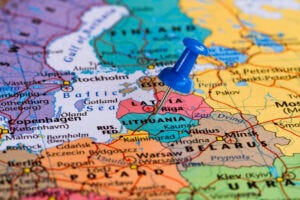
Northway Group will invest $7.6 billion over the next decade to construct Europe’s largest biotechnology hub in Lithuania, Vilnius.
The project has been named Bio City and is led by Northway Healthcare Group, which has subsidiaries including contract development manufacturing organizations (CDMOs) Northway Biotech and Celltechna. The aim of the project is to boost Lithuania’s presence in the global biotech space by establishing four advanced biomanufacturing facilities and two research centers.
Northway said it will be the largest biotech city in Europe covering an area equivalent to 10 football fields. In total there will be four manufacturing plants and two scientific research centers. Celltechna is building an 8,000 square-meter gene therapy center – expected to be completed by 2024 – and anticipates more than 100 jobs will be created.

DepositPhotos/WEAD
Northway claimed the gene therapy facility will be the first of its kind located in the Baltic States, which will bolster Lithuania’s role in gene therapy. The gene center will work with CDMO Northway Biotech, which invested $40 million in May 2022 to build a facility in Waltham, Massachusetts offering microbial and mammalian cell line development and upstream and downstream process advancement.
Additionally, by 2030 there are plans to add five additional complexes. The five hubs will include an R&D and virology center, large-scale microbial production center, large-scale mammalian production center, life science service center, and steam cell research and 3D bioprinting center.
“Having operated as a biologics CDMO for the past 20 years, we believe that now is the right time for us to venture into the gene and cell therapy field,” Vladas Bumelis, CEO of Northway Biotech and Celltechna told BioProcess Insider.
“Lithuania holds a strong position in the global biotechnology landscape. What sets our facilities apart is the integration of various biotech segments into a single ecosystem, facilitating collaborations and the rapid realization of ideas and technologies. Vilnius, the capital of Lithuania, was chosen due to its excellent university system and the concentration of life science talents in Lithuania.”
Life sciences in Lithuania
In January 2022, Karolina Karl, head of Life Sciences team at non-profit invest agency Invest Lithuania, said the country could provide a solution to the talent shortage as it has “a pool of highly skilled and motivated talent ready to create added value for your business.”
OECD Employment, 2020 Lithuania reported the country has a large academically trained population and the highest employment rate of tertiary-educated young adults in the European Union (EU) at 90%. And In 2017 an initiative entitled Work in Lithuania was created and it aimed to encourage professionals who lived overseas to build their careers in Lithuania. This, in conjunction with other incentives such as compulsory internships at universities, state-funded apprenticeships, and 55,000 people a year being eligible for ad-hoc re-qualification through the Lithuanian Employment Agency expands the country’s skilled personnel.
“We anticipate creating 2,100 jobs across all six complexes to be built,” Bumelis said.
“The main challenge we face is not a shortage of competent specialists; Lithuania boasts many highly qualified professionals. However, we are in a global competition for talent, and increasingly, our specialists are choosing opportunities abroad. To address this, we are committed to attracting and enticing experienced specialists from abroad who can work with us and contribute to the growth and innovation of the biotechnology sector in Lithuania. Currently, there is a lack of investment from the public sector, so we are seeking support from foreign private investors who can contribute to the project’s growth and success.”
About the Author
You May Also Like






